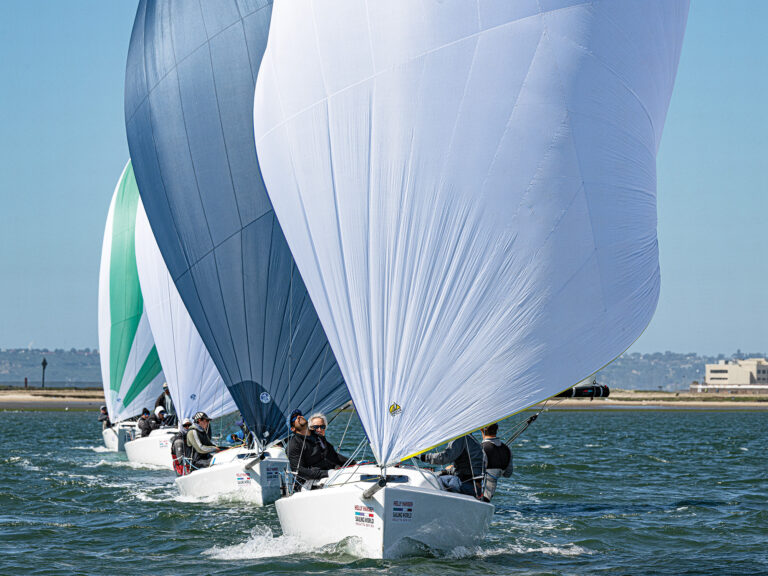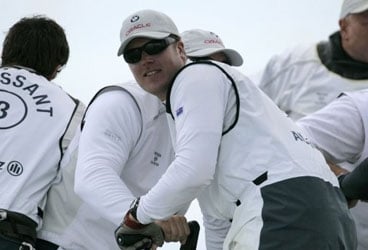
Giordano1
Tiny doesn’t say much. He grips the metal bars as if he’s about to do chin-ups, his big white boat shoes standing firm on the deck as he squats down. I hold on to the two opposite handles and watch his white knuckles. “You won’t get much out of him,” says Roodles, another sailor, standing behind me and referring to Tiny. “You can’t have both. You’ve got either brawn or brains.” Great, I think, eyeing Tiny.
And then we go, churning the handles as if we’re pedaling a bike with our arms; I fear for my chin, that it doesn’t get jabbed; my arms turn to two pieces of rubber; my heart pounds out of my chest. But within minute, we’ve hoisted the mainsail to the top of the 130-foot rig. A few moments later I turn toward the cool navy blue water and almost chunk.
I am spending the day with BMW Oracle Racing at their winter training site in Auckland, New Zealand. The team is practicing for what everyone calls “Valencia,” a.k.a. the 2007 America’s Cup. It’s summertime in New Zealand, and the water is dark blue and calm; the thermometer hovers around 80 degrees, though it feels more like a high 60.
Fortunately, my day doesn’t start out with Tiny, whose real name is Carl Williams, or Roodles, whose real name is Rodney Daniel, both grinders. Nor does it start out grinding. My day starts out at a seemingly nondescript empty pier in Auckland Harbor, where the team has set up shop. It looks like a shady gangster operation. The pier is a big open warehouse with makeshift wooden desks and lots of guys walking around wearing white T-shirts. I am first introduced to a Japanese man named Fuku; his real name is Kazuhiko Sofuku, he’s one of the team’s bowmen. When he’s not sailing, he helps maintain the rig.
“It’s kind of exciting,” he says with a beaming smile as though he just got the job yesterday. Meanwhile, he’s walking fast toward the ground floor of the warehouse, a big open space that’s a few thousand square feet with a gray concrete floor that is almost entirely covered with sails. For whatever reason, when I see all the sails, I say to him, “You think I’m going to need Dramamine?”
For the next twenty minutes I carry dripping wet sails from the warehouse to one of the boats. There are about a dozen non-sailors, men and women, shuttling around and helping out. I’m impressed with how efficient everyone is and how serious, though everyone seems to be smiling as they go about their work. There doesn’t seem to be a single moment wasted, nor a single action wasted, and it’s nice to know a man like myself with no experience can join right in. “Ask if they need help. Offer help.” Those were the words from Peter Isler the night before when I met him at a BMW-sponsored party.
The BMW sponsored event the night before had a theme: Breaking a mast. This had actually happened the day before I joined the crew. A replacement cost of $750,000 was bandied about during the party. At the time, it didn’t mean much to me, but it would end up dictating my afternoon with the team, since they would spend most of it “tuning” the new mast. How the other mast broke remained a mystery. The crew weren’t interested in speculating.
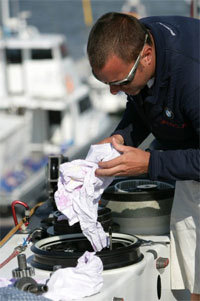
After carrying a few sails I stop near an empty tractor-trailer container. I’m drawn in by the sound of reggae music. Inside there’s a red-faced guy sitting on a workbench fiddling with lots of bolts and screws and other mechanical detritus. His name is Pete Balash and he sounds like another Kiwi to me, but after a few queries, he tells me he’s originally from Michigan. “You really lost your accent,” I say.
“As soon as I turned 18 I got out of Michigan,” he replies.
Pete proceeds to tell me he’s part of the shore crew. His job is to fix things, his words exactly. “I don’t know how I got this position,” he says. “Building boats with guys in the past, someone calls you up for a job. I’m a boat builder, like a mechanic. I like fixing things and having to fix it quickly.”
“Do you sail with the team?”
“Not really. Sometimes I fix stuff on the water. That’s fun. I have a tool belt and I wear my speedos.”
“Nice,” I say.
“If there’s something not working, I fix it. Broken winches, hardware, anything. Something goes wrong I jump on it.”
“You ever have to fix any of the guys. They ever break down and come to you?”
“Yeah. Emotional problems.”
I soon realize that getting a straight answer out of anyone is tough. The general attitude is to laugh first and often. I leave off from Balash, but not before he gives me an email of a friend of his who goes skydiving in Queenstown. He advises me to look him up. Balash tells me he’s got a parachute in the trunk of his car. He jumps whenever he can.
I then meet Z-real name Jon Ziskind, he’s a trimmer. We immediately hit it off and I find out soon enough that Z is from Long Island. Ah, a New Yorker. He takes me into a room off to the side of the main warehouse where there’s a giant TV screen. It looks like a version of an archaic video game, but in fact, it’s the technological side of sailing. Wind currents and speeds, weather, facts on the team’s previous sails that week, courses; it’s a myriad of information that Z nicely tries to keep secret.
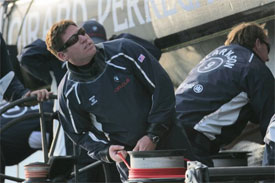
“So this is your job?” I say.
“Part of it.”
Z is all smiles, but while looking at this plasma sized TV monitor he looks almost guilty about the excessive amount of nautical information presented on the screen. I ask him what a trimmer does and he starts laughing: “We hold onto rope all day.”
After a few laughs and some more video games, Z takes me around the corner for a latte. Then he tells me how he got here: “I never sailed on one of these boats. I arrived on a 5 a.m. flight to New Zealand, and they were like ‘What do you do?’ I said I like to trim. The winches turn opposite ways on either side of the boat. I had jeans on. I figured I’d be on the 9 o’clock flight home, I wouldn’t make it, but I managed to make it through the first day, and every day I got a little better. By the end of the week I made it on the team.” That was in 1999. Z is a regular crewmember now. His parting words to me the next day are, “Have a slice of New York pizza for me will ya?”
When we return to camp so to speak, lunch is being served. And what a lunch it is. One of the sailors cooks tuna, lamb, and steaks on a big barbecue. Fruit, salad, gaucomole are all served with bread. It’s a feast to me, but the team eats like this every day. However, since we’re going out on the boat, our lunches are packed. A minute later, and we’re off.
The first thing I notice when I’m on the boat is that there’s not a lot of room; and that there’s no toilet. Nor is there an engine. We are towed out. I quickly find out what my nickname is too. “Up Here Kevin” is my name because someone keeps telling me to come up here. Also there’s seventeen guys on the boat and at least 16 of them warn me about where I put my hands. “Don’t touch any of the ropes.”
While we’re being towed out for about an hour, the team eats together on the boat. I opt for the lamb but I’m actually thinking about the Dramamine I didn’t take.
“If you’re going to chunk, do it over the side,” one of the guys says. “Make sure you do it over the side.”
“You’re not going to chunk are ya?” Another one says.
“I don’t know,” I say. “I’ve never been sailing.” That stopped them cold. “You’re about to go from zero to 90.”
There’s an intimacy on the boat that’s indescribable, as if we’re all waiting for the enemy to appear. Most of the guys are crouched down on the deck with their plastic lunch containers between their legs; one guy quietly writes down numbers on a little pad. He seems so deep in thought I’m afraid to ask him what’s he doing. Off in the distance, but getting closer by the second, is a dormant volcano.
While I thought I’d be just hanging all day, once the tow is let loose, they remove the boom from its crutch. I see a small guy about my height maybe even shorter, roughly 5’5″, putting on a harness. His name is Nick 46, real name Nick Partridge. He’s also a member of the foredeck team, a mid bowman to be specific. “I make sure the sails are okay and that the right sails go out at the right time,” he says.
“What’s your favorite part of the job?”
“Going up the rig. I won’t go up during the race unless something goes wrong. But I have to go up ever day. It’s 33 meters up the mast off the water. Usually it’s the small-guy type of job. Agile, monkey like, good constitution.”
“I was going to bring some Dramamine. Think I’ll need it.”
“I’ll check out the weather for ya.”
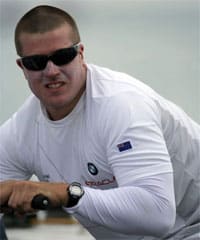
It’s ironic that I speak with Nick 46 because a few seconds later I am partly responsible for hoisting him up the rig. It’s my first grind and my first with Tiny, but I get no direction. I just stare at Tiny’s white knuckles and white grease paint face and mirror sunglasses and hope I can roll with this. And then bam, we start grinding. In seconds Nick 46 is up the mast and I feel like I just busted out 100 push-ups in 10 seconds. An impossibility of course and that’s why I feel like I’m going to be sick. But my hard work with Tiny shows impressive results, as I look up and see Nick 46 all the way up the mast, in his little jumper and steel latches, dangling like a doll attached by string to a stick.
Once the main sail is up, the sailboat has a rhythm to it. When the chase boat pulls up with the fumes and the bobbing up and down, I feel sick almost watching it. But on the actual sailboat, I’m fine. I begin to understand the naturalness of sailing. I try to imagine the decades and centuries of sailors who had to wait for the wind and catch a drift. I feel like I’ve been bitten by the sailing bug-that quick and simple. I get a glimpse of nature; I become an environmentalist and imagine myself condemning the use of speedboats.
My reverie is broken at that moment when Roodles points out some of the other guys aboard, all by their nicknames. Few of them take any notice of me except to say, “watch your hands.”
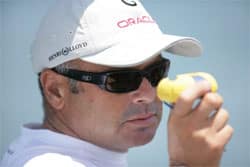
A Frenchman barks out various orders in an English that I can’t understand. His name is Bertrand Pace. Then there’s Sten Mohr, afterguard; Paul Westlake, the main trimmer; main grinder is Tiny; Morgan “Trubinator” Trubovich; Robbie “the Battler” Naismith, trimmer; Brian MacInnes; David “the Rat” Blanchfield; and Stu Clarke.
There’s an even split among the crew. They are either married with kids, or single and partying. The married guys talk about their kids and the single guys don’t mention aloud what goes on after hours. But once Westlake calls to head off on starboard it’s like a sudden huddle on the football field; everyone crouches and gets into position. I’m with Tiny again and fearing for my arms and chin. The cockpit floor suddenly becomes practically vertical.
There’s something about the moment when it all starts to come together; it’s like a bolt of adrenaline when the wind fills the sails and we’re moving. Being all hunkered down and at work, however, you can almost forget you’re sailing. My idea of sailing is having a glass of wine on the deck and admiring the views, more like vacationing poolside. This is actual work. I have to keep my head about me, watching for my hands to be snared on a rope, my feet to get caught up. At one moment I’m grinding, I see my foot is placed inside a circle of rope that’s slowly being pulled taut; my ankle looks like it’s about to be snared. I see myself being pulled over board or having my foot taken off. We’re talking about 16 tons of weight. A limb can go fast with that kind of weight. Or load as they say. Fortunately I’m quick on my feet and get out of it.
Although today is suppose to be a scrimmage against the sister boat, things take a change and we spend most of the afternoon tuning the new mast. Nick 46 spends most of the day dangling from the rig. Westlake keeps the side of his face against the tube as if he’s listening for an oncoming train; Nick 46 makes adjustments on the metal rods.
Long periods of quiet, hushed conversation permeate the boat’s crew. Nick hangs on the rig, Westlake keeps his face against the mast. It must feel cool, I think. The French man appears and disappears like a dictator.
Hushed conversation continues from guys like Tiny and Roodles, waiting for the next grind. Westlake makes a call and everyone busies to work and the mast swings to the other side.
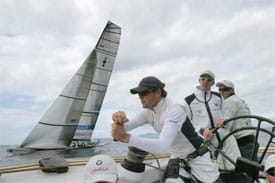
Meanwhile, I’m trying to make sense of this thing called “tuning a mast.” I listen to the whining and groaning of the load on the rope and the rope on the boat. “The priority is tuning the mast,” one of the guys says to me. “As long as that gets done, we’ll be ready for Monday.”
I don’t dare to ask. If I speak, it’ll be like screaming in church. So I whisper to one of the guys about the team and the races.
“How does it go with who gets to sail in the actual races?”
“We rotate a little,” he says. “It’s like an A and B team. It’s like any sport. Some guys come off the bench.”
I picture my beloved New York Yankees. Not quite the same thing.
“What about Valencia?” I ask.
“The water is dirty but the city is ancient and can be fun.”
There’s a pregnant pause. I see the volcano that is now within swimming distance. The calm blue water, a cool breeze. All is peaceful. It’s a nice day on a nice body of water in a nice country with nice guys. Then the quietude is cut off by a call from Westlake. A sudden burst of movement and the mast swings to the other side. After that, all the kids retreat into their position, relaxed, chugging big bottles of water. It’s a waiting game. Back and forth, back and forth. From quietude to a burst of movement.
For the rest of the afternoon I notice this juxtaposition, and also the serenity among the guys. I imagine they’ll need it when they leave for Valencia and for the coming months. Nerves of steel, and patience. While I leave with sore shoulders, a new nickname, and a deep appreciation for sailing. Not to mention a newfound respect for teamwork and laughter.
K.P. Giordano hates to admit he’s from New Jersey, but it came in handy when he made a request in February to spend a day with BMW Oracle Racing while the team was training in Auckland, New Zealand. “One of the higher-ups is from my hometown,” Giordano said. “I basically talked my way on the boat. It’s a Jersey thing.”






